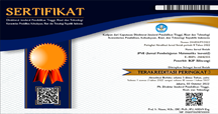PENERAPAN APLIKASI GOOGLE CLASSROOM SEBAGAI MEDIA PEMBELAJARAN ONLINE MATEMATIKA SELAMA PANDEMI COVID-19 DI SMA NEGERI 1 TONGAS
DOI:
https://doi.org/10.22460/jpmi.v4i6.p%25pKeywords:
Google Classroom, Online learning, Covid-19Abstract
The outbreak of the Corona virus or Covid-19 in Indonesia since March 2020 has affected various aspects of life, especially education in Indonesia. One of the government's policies to suppress the spread of the Corona virus is to close school activities. Online learning is a solution to overcome the challenges of face-to-face learning. The Google Classroom application is an application created by Google specifically developed to support the implementation of online learning. The subjects of this study were 87 students of class 11th. The instrument used was a mathematics achievement test and a questionnaire. The data analysis technique uses descriptive qualitative data analysis, where student learning outcomes achieve learning completeness of at least 70%. The results showed that 59.77% of students were very happy with the implementation of Google Classroom when learning Mathematics during the pandemic, and 56.32% of students felt happy when doing independent assignments given through Google Classroom. 56.32% of students feel interested in the mathematics learning process. 62.07% of students find it easy to apply the Google Classroom application in the Mathematics learning process. However, based on the results of several indicators, some students think that face-to-face learning is still very much needed. In addition, teachers are required to support the activities of their students to stay motivated to engage in online learning.
References
Alfina, O. (2020). Penerapan Lms-Google Classroom Dalam Pembelajaran Daring Selama Pandemi Covid-19. Majalah Ilmiah METHODA, 10(1), 38–46. https://doi.org/10.46880/methoda.v10i1.537
Alim, N., Linda, W., Gunawan, F., & Saad, M. S. M. (2019). The effectiveness of Google classroom as an instructional media: A case of state islamic institute of Kendari, Indonesia. Humanities and Social Sciences Reviews, 7(2), 240. https://doi.org/https://doi.org/10.18510/hssr.2019.7227
Auliya, R. N. (2016). Kecemasan Matematika dan Pemahaman Matematis. Formatif: Jurnal Ilmiah Pendidikan MIPA, 6(1), 12–22. https://doi.org/10.30998/formatif.v6i1.748
Harefa, N. (2020). Persepsi Siswa terhadap Google Classroom sebagai LMS pada masa. 2(2). https://doi.org/http://jurnalpendidikan.unisla.ac.id/index.php/SEAJ/article/view/270
Huda, N. (2011). Analisis Faktor-Faktor Dominan Yang Mempengaruhi Hasil Belajar Matematika Siswa Smp N 1 Muaro Jambi. Journal Sains Dan Matematika, 3(1), 14–30. https://doi.org/https://www.neliti.com/id/publications/221114/analisis-faktor-faktor-dominan-yang-mempengaruhi-hasil-belajar-matematika-siswa#cite
Iqbal Hasan, M. (2002). Pokok-Pokok Materi Metodologi Penelitian dan Aplikasinya. Ghalia Indonesia.
Khasanah, D. R. A. U., Pramudibyanto, H., & Widuroyekti, B. (2020). Pendidikan Dalam Masa Pandemi Covid-19. Jurnal Sinestesia, 10(1), 41–48. https://sinestesia.pustaka.my.id/journal/article/view/44
Kunter, M., Tsai, Y. M., Klusmann, U., Brunner, M., Krauss, S., & Baumert, J. (2008). Students’ and mathematics teachers’ perceptions of teacher enthusiasm and instruction. Learning and Instruction, 18(5), 468–482. https://doi.org/10.1016/j.learninstruc.2008.06.008
Mustakim, M. (2020). Efektivitas Pembelajaran Daring Menggunakan Media Online Selama Pandemi Covid-19 Pada Mata Pelajaran Matematika. Al Asma : Journal of Islamic Education, 2(1), 1. https://doi.org/10.24252/asma.v2i1.13646
Najichun, Mohamad & Winarso, W. (2017). Hubungan persepsi siswa dengan gaya mengajar guru matematika dengan hasil belajar matematika Najichun , Mohamad and Winarso , Widodo. Jurnal Psikologi Undip, 15(2), 139–146. https://doi.org/https://mpra.ub.uni-muenchen.de/79263/
Rahardjo, M. (2017). Desain Penelitian Studi Kasus (Pengalaman Empirik). https://doi.org/http://repository.uin-malang.ac.id/1423/
Ramadhani, R., Astuti, E., & Setiawati, T. (2019). Implementasi LKS Berbasis Budaya Lokal Menggunakan LMS Google Classroom di Era Revolusi Industri 4,0. Sindimas, 1(1), 13–17. https://doi.org/http://dx.doi.org/10.30700/sm.v1i1.527
Santoso, B. (2020). Penerapan E-Learning Berbasis Google Classroom. 1(1), 100–108. https://doi.org/https://www.academia.edu/43969538/Penerapan_E_learning_Berbasis_Google_classroom_Sebagai_Media_Pembelajaran_Al_Islam_dan_Kemuhammadiyahan_di_Tengah_Pandemi
Saputra, I. D., Syafik, A., Studi, P., Matematika, P., & Purworejo, U. M. (2016). PENGARUH PERSEPSI TERHADAP PRESTASI BELAJAR MATEMATIKA SISWA KELAS VIII SMP/MTs SE-KECAMATAN GOMBONG KABUPATEN KEBUMEN. Ekuivalen, 104–107. https://doi.org/https://doi.org/10.37729/ekuivalen.v21i2.
Sukmawati & Nensia. (2019). The Role of Google Classroom in ELT. International Journal for Educational and Vocational Studies, 1(2), 142–145. https://doi.org/10.29103/ijevs.v1i2.1526
Tiro, M. A. (2004). Dasar-Dasar Statistika. Universitas Negeri Makassar.
Wardana, A. N., Hairunnisa, & Wibowo, S. E. (2018). Pengaruh Persepsi Siswa Sman 2 Samarinda Terhadap Minat Dalam Memilih Universitas Mulawarman. Journal Ilmu Komunikasi, 6(4), 327–341. https://doi.org/https://ejournal.ilkom.fisip-unmul.ac.id/site/?p=3710

















